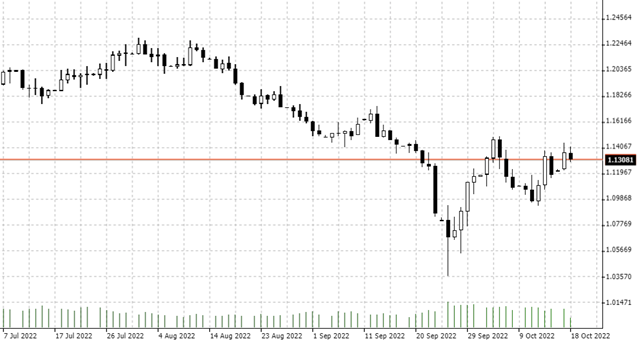

18.10.2022 – Big clearing in Britain: The new finance minister cuts “trussonomics” – Sterling recovers. And the global financial market right along with it.
Yesterday, Monday, the new British Chancellor of the Exchequer, Jeremy Hunt, reversed almost all of the announcements made by Prime Minister Liz Truss and his predecessor as Chancellor of the Exchequer, Kwasi Kwarteng. Ten-year government bond yields fell by as much as 41 basis points. “Cable” has recovered since dipping in the wake of the Truss plans, as you can see in the daily chart of GBPUSD.

Source: Bernstein Bank GmbH
The change of course in the UK was also an important boost for the world stock markets. Recently, Matt Fleury of Goldman Sachs had said that this time the UK could trigger a global financial crisis: “The Fed’s continued aggressive pace of hikes is causing unexpected knock on effects. I was certainly not aware of how levered the UK LDI pensions were.” LDI stands for liability-driven investing. This means that pension funds speculate on credit with the underlyings as collateral – and if the price of their investments falls, they have to inject fresh money in margin calls. This is usually done by selling underlyings, such as British gilts.
Away with it
So now British government bonds are recovering. That’s because Hunt left virtually nothing of his predecessor’s growth plan: Corporation tax is to rise from 19 to 25 percent in April. Boris Johnson’s Chancellor of the Exchequer Rishi Sunak had already planned this, but Prime Minister Liz Truss and Kwarteng wanted to boost the economy by cutting taxes instead. Hunt has now cancelled the one percentage point reduction in the income tax entry rate that they had planned. The alcohol tax is no longer frozen. The idea of allowing foreign tourists to store VAT-free is off the table. A reduction in the taxation of dividends and relief for the self-employed are again capped.
Hunt is sticking to neo-Thatcherism on only a few minor points: what remains is the reversal of the increase in social security contributions. And the cap on bankers’ bonuses is still to be abolished, according to the Telegraph. Hunt also left in place the changes to stamp duty for homebuyers introduced by his predecessor.
Warning from Morgan Stanley
However, the situation is not yet completely cleared. Morgan Stanley over the weekend saw the UK facing an almost impenetrable web of problems. Andrew Sheets, chief cross-asset strategist at Morgan Stanley, judged that the island, as the world’s sixth-largest economy, faces a “volatile and fascinating cross-asset story.” The first problem, he said, is high inflation, with a core rate of 6.3 percent. With a current account deficit of 5.5 percent of gross domestic product, Brexit has tightened the supply of labor and increased labor costs and import prices, he said. As a result, “high inflation drives currency weakness, and vice versa.”
The Bank of England had also not raised interest rates as much as investors had expected – since the BoE had not delivered, but the Federal Reserve had, investors expected further weakness. The BoE’s hesitation is understandable, he said, and is due to the domestic housing market – most loans are for two to five years. Most households are already burdened enough by rising energy costs. We add: After all, with Hunt’s about-face, the government has now addressed a second part of the problems noted by Morgan Stanley.
Waiting for the interest rate hike
This puts the onus on the Bank of England. Governor Andrew Bailey had said at the IMF meeting in Washington that inflationary pressures may require “a stronger response” from monetary policy than was expected a few months ago. Our conclusion from the mix: this looks like a new interest rate move. And things get really exciting on October 31 – on Halloween, the government presents its medium-term budget plan. Bernstein Bank keeps an eye on the situation for you!
_______________________________________________________________________________________________
The content of this publication is for general information purposes only. In this context, it is neither an individual investment recommendation or advice nor an offer to purchase or sell securities or other financial products. The content in question and all the information contained therein do not in any way replace individual investor- or investment-oriented advice. No reliable forecast or indication for the future is possible with respect to any presentation or information on the present or past performance of the relevant underlying assets. All information and data presented in this publication are based on reliable sources. However, Bernstein Bank does not guarantee that the information and data contained in this publication is up-to-date, correct and complete. Securities traded on the financial markets are subject to price fluctuations. A contract for difference (CFD) is also a financial instrument with leverage effect. Against this backdrop, CFD trading involves a high risk up to the point of total loss and may not be suitable for all investors. Therefore, make sure that you have fully understood all the correlating risks. If necessary, ask for independent advice. CFDs are complex instruments and are associated with the high risk of losing money quickly because of the leverage effect. 68% of retail investor accounts lose money trading CFD with this provider. You should consider whether you understand how CFD work and whether you can afford to take the high risk of losing your money.7
